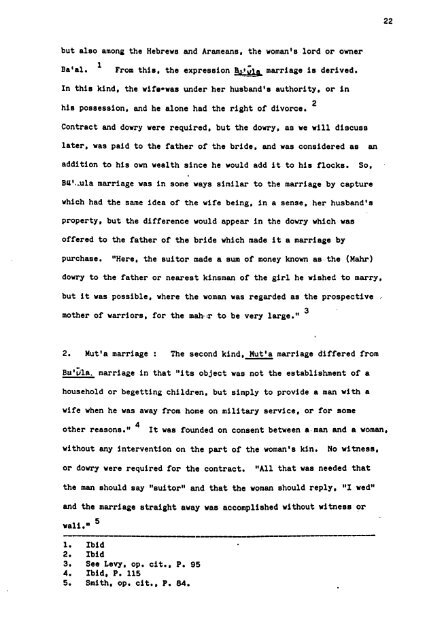Download - University of Salford Institutional Repository
Download - University of Salford Institutional Repository
Download - University of Salford Institutional Repository
You also want an ePaper? Increase the reach of your titles
YUMPU automatically turns print PDFs into web optimized ePapers that Google loves.
ut also among the Hebrews and Arameans, the woman's lord or owner<br />
Balal.<br />
1<br />
From this, the expression marriage is derived.<br />
In this kind. the wifsowas under her husband's authority. or in<br />
his possession. and he alone had the right <strong>of</strong> divorce.<br />
Contract and dowry were required, but the dowry, as we will discuss<br />
later, was paid to the father <strong>of</strong> the bride, and was considered as an<br />
addition to his own wealth since he would add it to his flocks. So,<br />
B41-ula marriage was in some ways similar to the marriage by capture<br />
which had the same idea <strong>of</strong> the wife being, in a sense. her husband's<br />
propertyq but the difference would appear in the dowry which was<br />
<strong>of</strong>fered to the father <strong>of</strong> the bride which made it a marriage by<br />
purchase. "Here, the suitor made a sum <strong>of</strong> money known as, -the<br />
2<br />
(Mahr)<br />
dowry to the father or nearest kinsman <strong>of</strong> the girl he wished to marry,<br />
but it was possible, where the woman was regarded as the prospective -<br />
mother <strong>of</strong> warriors. for the mah, --r to be very large. " 3<br />
2. Mutla marriage The second kind, Mutla marriage differed from<br />
BuIV'la. marriage in that "its object was not the establishment <strong>of</strong> a<br />
household or begetting children. but simply to provide a man with a<br />
wife when he was away from home on military service. or for some<br />
other reasons. " 4<br />
It was founded on consent between a-man and a woman,,<br />
without any intervention on the part <strong>of</strong> the woman's kin. No witness#<br />
or dowry were required for the contract. "All that was needed that<br />
the man should say "suitor" and that the woman should reply* "I wed"<br />
and the marriage straight away was accomplished without witness or<br />
walie" 5<br />
1. Ibid<br />
2. Ibid<br />
3. See Levy, op. cit., P. 95<br />
4. Ibid. P. 115<br />
5. Smith, op. cit., P. 84.<br />
22
















